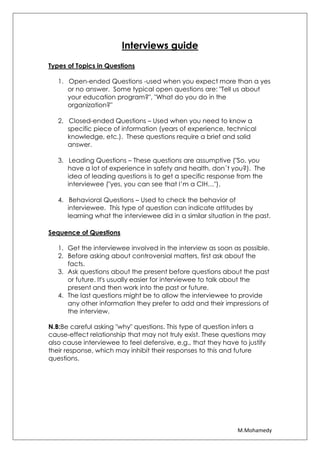
Interviews tips
- 1. Interviews guide Types of Topics in Questions 1. Open-ended Questions -used when you expect more than a yes or no answer. Some typical open questions are: "Tell us about your education program?", "What do you do in the organization?" 2. Closed-ended Questions – Used when you need to know a specific piece of information (years of experience, technical knowledge, etc.). These questions require a brief and solid answer. 3. Leading Questions – These questions are assumptive ("So, you have a lot of experience in safety and health, don´t you?). The idea of leading questions is to get a specific response from the interviewee ("yes, you can see that I’m a CIH…"). 4. Behavioral Questions – Used to check the behavior of interviewee. This type of question can indicate attitudes by learning what the interviewee did in a similar situation in the past. Sequence of Questions 1. Get the interviewee involved in the interview as soon as possible. 2. Before asking about controversial matters, first ask about the facts. 3. Ask questions about the present before questions about the past or future. It's usually easier for interviewee to talk about the present and then work into the past or future. 4. The last questions might be to allow the interviewee to provide any other information they prefer to add and their impressions of the interview. N.B:Be careful asking "why" questions. This type of question infers a cause-effect relationship that may not truly exist. These questions may also cause interviewee to feel defensive, e.g., that they have to justify their response, which may inhibit their responses to this and future questions. M.Mohamedy
- 2. Conducting Interview 1. Attempt to remain as neutral as possible. That is, don't show strong emotional reactions to their responses. 2. Encourage responses. Occasionally nod the head, "uh huh"s, etc. 3. Be careful about the appearance when note taking. That is, if you jump to take a note, it may appear as if you're surprised or very pleased about an answer, which may influence answers to future questions. 4. Provide transition between major topics, e.g., "we've been talking about (some topic) and now I'd like to move on to (another topic)." 5. Don't lose control of the interview. This can occur when respondents stray to another topic, take so long to answer a question that times begins to run out, begin asking questions to the interviewer, or another person in the room starts asking questions. Immediately After Interview 1. Make any notes on your written notes 2. Write down any observations made during the interview. For example, where did the interview occur and when, was the respondent particularly nervous at any time? Were there any surprises during the interview? Avoid 1. Talking incessantly (or more than the candidate 2. Asking closed or leading questions, unless you want to know something specific 3. Asking irrelevant questions 4. Halo/Horns Effect: This happens when an interviewer places too much emphasis on one positive characteristic (Halo) or one negative characteristic (Horns) and allows this to unfairly shape their overall opinion of the candidate M.Mohamedy
- 3. 5. Primacy/Recency Effect: Interviewers tend to remember the first and last person interviewed and may place unfair emphasis on these candidates in a positive or negative way simply because these candidates are more prominent in the interviewers mind. General Tips In the interview, aim to 1. Put candidates at ease 2. Give background information on the organization and ensure all interview terms and conditions are covered 3. Structure your questioning 4. Ask open questions 5. Start the interview with questioning in familiar 6. Avoid irrelevant personal questioning 7. Make sure the candidate’s questions 8. Be prepared to listen more than speak 9. Observe the time 10. Take notes unobtrusively 11. Ensure that an indication of the next step is given to the candidate. Interviews Questions: Open-Ended Questions STAR Model: Tell me about a time when Give me an example of a situation where Describe a situation when This type of question if often followed up with probing questions like What was your role in that situation? What action did you take? What did you do next? M.Mohamedy
- 4. What was the outcome? How did you respond? What would you do differently next time? What did you learn from that experience? How did you feel when that happened? What was going through your mind when that happened? • How did you do that? Thanks in advance, M.Mohamedy
